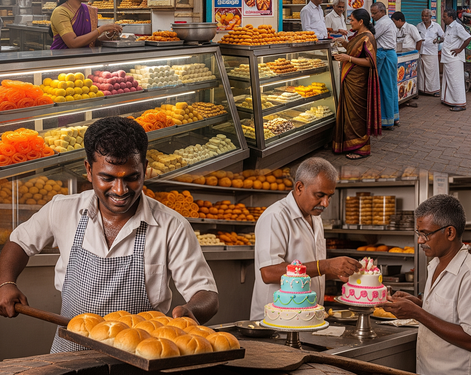
Chokkapan S (cbedit@imaws.org)
The bakery industry in Tamil Nadu, one of the most dynamic in South India, is currently on the verge of intense transformation. From the busy markets of Chennai to the central zones of Thanjavur, Tiruchirappalli and Madurai, bakeries have proliferated rapidly, reflecting rising urbanisation and evolving consumer tastes.
The state today is home to over 13,700 bakeries and cake shops, marking a 6% growth since 2023. A striking 87% of these are single-owner operations, with the rest under larger chains — highlighting how the industry still largely relies on small-scale entrepreneurship. Across key cities, Chennai leads with 1,574 outlets, followed by Coimbatore (1,002), Tiruppur (761), and Madurai (570). Meanwhile, Chennai has seen a modest 2.9% increase in bakery counts since 2023 and is averaging an age of 4 years and 6 months, a slight edge in longevity over the state average of 3 years and 11 months. On the wholesale front, the sector counts 307 wholesalers as of May 2025, most of which are also single-owner — averaging just over four years old.
But all these impressive figures conceal an uncomfortable truth: while established brands are consolidating their dominance, a large number of smaller and newer ventures are folding within just a few years of opening.
At the heart of this industry stands S. Pandurangan, the newly-elected President of the Tamil Nadu Bakers Federation India (TNBF) and the man behind Krishna Sweets and Bakery in Thanjavur. With decades of entrepreneurial experience and a pan-state vantage point through TNBF, Pandurangan provides a candid assessment of the opportunities and pitfalls facing bakers in Tamil Nadu.
The Harsh Reality of Competition
The density of bakeries in Tamil Nadu makes competition fierce. Take Madurai, which alone accounts for more than 570 bakeries. Across the state, nearly 87% of outlets are single-owner businesses, often launched with modest capital and high hopes. Yet, the average life span of a bakery is less than four years, highlighting the volatility of the trade.
“Large, reputed bakeries with established customer bases are thriving. But newcomers often underestimate market saturation and operational costs,” Pandurangan explains in a face-to-face interaction with Kitchen Herald. According to him, poor planning and lack of strategy before setting up shop is the single largest reason for premature closures.
Rising Rentals: The Silent Killer
Among the many challenges, the sharp rise in rentals is a recurring concern. Until recently, bakery rents were fixed based on the age and type of a building and the business zone in a town or city, keeping overheads manageable even for start-ups. Now, the square-foot rental model dominates, with prices climbing steadily, informs Pandurangan.

In Chennai, for instance, commercial rentals have surged by almost 20% in the last six years, rising from around ₹60 to ₹75 per sq. ft. per month. For small bakeries that rely on high-footfall areas, this escalation often proves unsustainable. “Earlier, rentals were nominal and allowed us to focus on operations. Now, monthly rent alone eats into margins and forces smaller players out,” Pandurangan observes.
Local Kitchens Prove a Game-Changer
Pandurangan believes that the only viable way forward for many is to invest in localised kitchens and baking units. This decentralised model ensures that products reach customers fresh and on time, while also cutting transportation costs.
“Consumers in Tamil Nadu are increasingly demanding round-the-clock service. A bakery with a local kitchen closer to its urban outlets can meet those needs and sustain operations 24×7,” he says. This approach is proving especially vital in central Tamil Nadu, where growing semi-urban markets present both opportunities and logistical challenges.
Employee Welfare as Priority
While market economics dictate many of the challenges, Pandurangan underscores that employee welfare cannot be compromised. Under TNBF’s leadership, the Federation has ensured that all workers earning under ₹25,000 per month are covered under Employees’ State Insurance (ESI) and Employees’ Provident Fund (EPF).

“These benefits are crucial for retaining talent in an industry known for high churn. Skilled hands are the backbone of bakeries, and welfare measures are both a moral responsibility and a business necessity,” he adds.
Food Safety: From Compliance to Collaboration
Unlike some other food sectors, bakeries in Tamil Nadu’s central districts report relatively smooth ties with the Food Safety Department. TNBF has played an active role in fostering cooperation through joint training programmes, awareness drives and technical workshops.
“This collaborative model reduces friction and helps professionals understand compliance better,” Pandurangan points out. “We’ve built a healthy rapport with our Food Safety Officers, and it’s been mutually beneficial.”
Egg-Based Products Pose A Perishable Challenge
While hygiene is critical across the board, egg-based bakery items are especially vulnerable. They carry the highest risk of quick spoilage compared to sweets and savouries, which mostly face fungal infections if neglected. Safe handling, temperature management, and quick turnover are therefore essential, points out Pandurangan.
As consumer expectations for freshness rise, bakeries that implement stringent hygiene practices stand a better chance of building trust and brand loyalty.
Planning, Foresight and Survival
Despite the mounting pressures, Tamil Nadu’s bakery industry continues to be a symbol of resilience. But the figures are sobering: thousands of outlets exist, yet only a fraction last beyond their initial years. Pandurangan’s message is clear — careful planning, realistic financial modelling, and decentralised kitchens are indispensable for survival in this highly competitive sector.
The Tamil Nadu Bakers Federation India, under his stewardship, is pushing for greater awareness, stronger employee welfare, and continuous dialogue with regulators. “Bakeries are part of our cultural and culinary fabric. If entrepreneurs enter the business with foresight and adaptability, they can certainly rise above the short-lived ventures we so often see,” Pandurangan concludes.
ADVERTISEMENT







